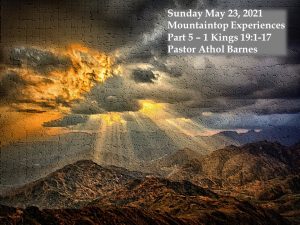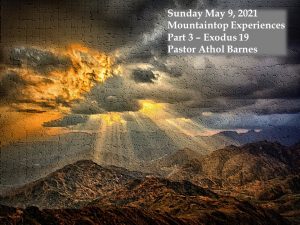
Matthew 17:1-13
Have you ever been in a meeting or a gathering where you wonder why you were asked to be there? Maybe you were called into a meeting to discuss some important subject with a group of experts, and you were not one of the experts!
This week we are looking at the mount of transfiguration that we have recorded in Matthew and Luke’s Gospel accounts. Peter, James and John must have felt very self-conscious as they stood on the mountain with Jesus, Moses and Elijah.
Why were they singled out to be on this mountain top for this amazing encounter?
As I read the account in Matthew, I had so many questions:
- Which Mountain?
- Why Peter, James and John?
- Why Moses and Elijah?
- What is a transfiguration?
- What language were they speaking?
- How did Peter know it was Moses and Elijah?
- What was the purpose of the transfiguration?
I will try to answer a few of these questions below:
- On which mountain did this take place?
There are two choices, Mount Tabor or Mount Hermon for the site of the transfiguration.
Most Scholars believe that Mt Hermon is the correct location of the transfiguration. It is almost 9000 feet high, whereas Mount Tabor is only 2000 feet high.
Matthew’s gospel places events leading up to the transfiguration in the district of Caesarea Philippi, making Mount Hermon the closer site.
- Why Peter, James, and John?
Jesus had an inner circle, these three disciples. Jesus revealed certain things to them as he was equipping them and training them to lead the early church.
Interestingly, we read in Exodus 24 that when Moses went up mount Sinai to receive the Law, he had three men with him, Aaron, Nadab and Abiu.
Peter, James and John became eyewitnesses to the glory of Jesus (see 2 Peter 1:16-18 and John 1:14). What these men witnessed became their testimony and they were changed forever.
- Why Moses and Elijah?
Why not some other Old Testament characters?
Moses and Elijah represent the Old Testament. Moses represents the Law and Elijah is the first among the prophets.
Jesus referred to the combination of the law and the prophets frequently as this encompassed the canon of the Old Testament (See Matthew 5:17, Matthew 7:12, Matthew 22:36-40).
The Appearance of Moses and Elijah, declares that Jesus is the Messiah, the fulfilment of everything that they themselves pointed towards.
- What is the Transfiguration?
The Greek word translated transfigured gives us our English word “metamorphosis.” A metamorphosis is a change on the outside that comes from the inside.
Jesus did not reflect glory from elsewhere, but he radiated glory and light from within. His human features changed, so that for a brief moment the disciples could see his true glory.
During the transfiguration as Jesus, Moses and Elijah were talking, Peter struggling for words, asked if he could build a shelter for them. He wanted to remain there and enjoy the glory.
But God the Father came down in a cloud and dispelled any confusion that the disciples might have had. God the Father would never permit His son to be placed on the same level as any human being.
This encounter changed the three disciples. When you encounter the risen Lord Jesus, you will never be the same again. Have you encountered the risen Lord?
As Jesus and His three disciples came down from the mountaintop, He cautioned them not to reveal what they had seen, not even to the other nine disciples.
The disciples were obviously full of questions. If Jesus was the Messiah, what about the prophecies that they had been taught since childhood? Malachi 4:5, “Behold, I will send you Elijah the prophet before the great and awesome day of the Lord comes.”
Was this the beginning of the Day of the Lord, the great day of judgment?
Jesus explained to them that John the Baptist was the forerunner, he was the Elijah, that made straight the pathway for Jesus. Jesus went on to explain that he was about to suffer and that his agenda was different to the plans that they had been taught for the Messiah. Jesus was the fulfilment of Isaiah 53, the suffering servant.
They still didn’t grasp what Jesus was about to be and do. Do we fully grasp who Jesus is?
He is more than a good man, a powerful miracle worker, a good role model or a respected teacher. The world around us, accepts this version of Jesus, but he is so much more than that.
Jesus is the Christ, the Son of the Living God (Matthew 16:16). He is the way the truth and the life (John 14:6). He is the only name by which anyone can be saved (Acts 4:12).
- How did Peter James and John know it was Moses and Elijah?
This may shock some of the younger generation, but they did not have Instagram accounts during the time of Moses. There was no way they would know what they looked like.
This is where we get a glimpse into eternity. I believe that in heaven, we will know everyone by name, a supernatural knowledge of each person.
This was such an incredible event in the life of Jesus on the earth, but for me there was one significant moment that precipitated the transfiguration.
Jesus invited the disciples to follow him, and they said yes!
In Matthew 4 we see that Peter, James, and John were of the first disciples to be called by Jesus, and immediately they dropped everything and gave him their yes.
When Jesus invited them up the mountain, they said yes.
Daily God gives us invitations to say yes. Sometimes it is a small yes, like taking a meal to a sick neighbor or helping someone who needs a ride. Maybe it is simply praying for someone you meet in a store.
Sometimes it is a bigger yes, when God might invite you to leave your home and move to a foreign land as a missionary. God might invite you to leave your career and go into ministry.
Whatever the invitation, when you give your yes, I can tell you from experience that your life will never be short of adventure, and it will certainly never be ordinary.
In what area of your life are you withholding a yes from God?
The Lordship of Jesus over your life, is a predetermined yes in your heart.




